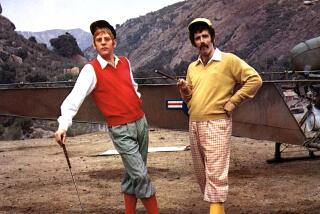Waldo’s World : Documentary Follows Life of a Blacklisted Film Writer
- Share via
Waldo Salt’s life sounds as compelling as one of his Oscar-winning screenplays.
At the age of 22, he was a Hollywood up-and-comer. The graduate of Stanford University scored a hit with his first screenplay for the 1938 Margaret Sullavan-James Stewart romance, “Shopworn Angel.”
The son of a suicidal mother and a right-wing extremist father, Salt was an idealist. The same year “Shopworn Angel” was released, he became a devoted member of the American Communist Party. That affiliation left him blacklisted in Hollywood from 1951 until 1962.
By the time he was 50, Salt was ill with pneumonia, divorced from his second of four wives, and suicidal, living in a cheap hotel in New York trying to churn out TV scripts.
Four years later, he was the toast of Hollywood, winning the first of two screenwriting Oscars for 1969’s “Midnight Cowboy.”
Salt’s remarkable life, career and comeback are chronicled in the Oscar-nominated 1990 documentary “Waldo Salt: A Screenwriter’s Journey,” produced and directed by Robert Hillmann and Eugene Corr and airing Friday on PBS’ “American Masters.”
Peter Coyote narrates the documentary, which features conversations with Salt, who died in 1987 of lung cancer. He was 72. Also interviewed are Jon Voight; director John Schlesigner; Robert Redford; producer Jerome Hellman; Salt’s second wife, Mary Davenport; his last wife, Eve Merriam; daughters Jennifer and Deborah Salt, and blacklisted screenwriters Ian Hunter and Ring Lardner Jr.
Hillman and Corr were former pupils of Salt, who taught young screenwriters at Robert Redford’s Sundance Institute from 1981 to 1986. The two began the film in 1984.
“We wanted to film so much more with Waldo, but he died,” Hillmann said. “We thought we were going to have many years to film Waldo in many different situations and, in fact, the first couple of days we spent turned out to be what we ended up with because he got sick after that.”
Jennifer Salt, a former actress (“Midnight Cowboy,” “Play It Again, Sam”), found the documentary “inspiring” and “powerful.” Though she was only 7 when her father was blacklisted, she vividly remembers those dark times.
“That is impossible to block out,” she said. “Our whole family was about (the blacklist) for a number of years. I remember the trips to Washington and coming home from Washington ... the hushed tones.”
During that period, several blacklisted writers kept working under assumed names. Salt, along with such writers as Lardner and Hunter, moved to New York and began writing for television. Lardner and Hunter were writing scripts for the popular TV series “Robin Hood” when they brought Salt on board because the producers “needed a lot more scripts than we could provide,” Lardner said. “We each had a permanent name for receiving checks and had bank accounts under those names. You would register those names for Social Security.”
But the producers, Lardner said, “decided to put all sorts of different names on the scripts because if one name appeared too frequently” the networks might get wind of what the producers were doing. “The networks might want to see the writer. (The producers) didn’t want that to happen.”
Salt’s name was removed from the blacklist in 1962. Though he quickly got work, his career only got worst. His first post-blacklist films--”Taras Bulba” (1962), “Wild and Wonderful” (1964) and “Flight from Ashiya” (1964)--were complete disasters.
“At best these are second-rate cult classics,” Hillmann said. “But they did Waldo as much harm as the decade he spent being blacklisted as an artist. The blacklist stripped him of his reputation and effectively banned him from Hollywood, but the kitsch he wrote in the early ‘60s cost him his self-respect.”
“Those were terrible times for all of us,” Salt said. “When you have a parent who goes through (losing his self-respect), it reverberates. The family was disintegrating. I was going off to college and it just felt the bottom was falling was falling through everything.”
Salt divorced his second wife and went back to New York, where he plummeted into what Hillmann described as an “emotional and financial abyss.”
It was only when family members confronted him about what he was doing to himself, Hillman said, that Salt “rose from the dead and vowed he would never embark on a project again he didn’t feel he could execute--that wouldn’t have the high standards he set for himself.”
Oscar-winning producer Jerome Hellman, who worked with Salt on “Midnight Cowboy,” “The Day of the Locust” and “Coming Home,” for which Salt received his second Oscar, said Salt’s life experiences turned him into a great writer.
“There isn’t any question about it,” Hellman said. “It is a truism that we only learn from the tragedies, the errors and the losses in our lives. Some people are destroyed by experiences like that. Waldo took the full force of life’s blows. He grew and rose above them.”
Jennifer Salt disagreed. “I don’t believe he became a good writer because he suffered,” she said. “I think he was a person, who despite the blacklist or if there had never been a blacklist, would have found his stride. He was a real artist.”
Salt said the documentary has changed her life. “It really made me believe you can make changes in your life and you can make them at any point.”
In the past few years, Salt, 47, has quit acting and turned to screenwriting. “I have a real career,” she said. “I have been hired to write two screenplays. It is totally great and unbelievable.”
And her father, she said, “would be very pleased.”
“Waldo Salt: A Screenwriter’s Journey” airs on “American Masters” Friday at 9 p.m. on KPBS and KCET.
More to Read
Only good movies
Get the Indie Focus newsletter, Mark Olsen's weekly guide to the world of cinema.
You may occasionally receive promotional content from the Los Angeles Times.











